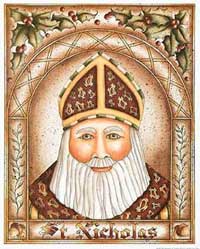Saint Nicholas
Happy St. Nicholas Day!

Well, here’s my annual (when I remember it) Saint Nicholas Day post. Yes, I know, I don’t give any other historic Christian saints this kind of attention, but the figure of Santa Claus is so ubiquitous in this season of the year — I think it’s helpful to refer back to the original source of this myth. I think we can learn much more from the real St. Nick than from his fat, commercialized imposter. (more…)
Calvin on John 3:16
“For God so loved the world that he gave his only Son, so that everyone who believes in him may not perish but may have eternal life.” — John 3:16 (NRSV).
JOHN CALVIN COMMENTS (my responses are in blue):
“’That whosoever believeth on him may not perish.’ It is a remarkable commendation of faith, that it frees us from everlasting destruction. For he intended expressly to state that, though we appear to have been born to death, undoubted deliverance is offered to us by the faith of Christ; and, therefore, that we ought not to fear death, which otherwise hangs over us. And he has employed the universal term whosoever, both to invite all indiscriminately to partake of life, and to cut off every excuse from unbelievers. Such is also the import of the term world, which he formerly used; for though nothing will be found in the world that is worthy of the favor of God, yet he shows himself to be reconciled to the whole world, when he invites all men without exception to the faith of Christ, which is nothing else than an entrance into life.”
Um. Okay. I think I’m with you there, brother John. (more…)
On the Colossian Heresy

People sometimes get idyllic notions of what the early Church was like. It is imagined that the early Church was more Spirit-filled, more unified, free from many of the problems the Church has today.
It’s just part of that instinctive yearning people have for “the good old days.” I don’t know why people believe in this notion. It seems to be intuitive: sometime, way back when, people didn’t have the problems we have today.
But, a careful reading of the letters of the apostle Paul in our New Testament will quickly disprove this notion. The letters of Paul were often written to correct false teachings and false practices that had arisen in the churches to which he wrote. Much of the New Testament we owe to the problems in the early Church.
Some of the unique features of Paul’s letter to the Colossians can be explained by the fact that the apostle Paul is replying to a type of false teaching (or false teachings) that were circulating in the Colossian church. This concern comes to the surface, for example here: (more…)

